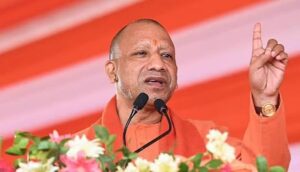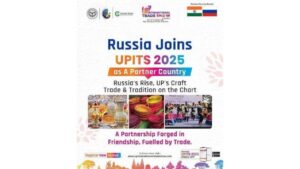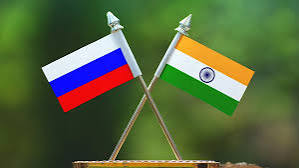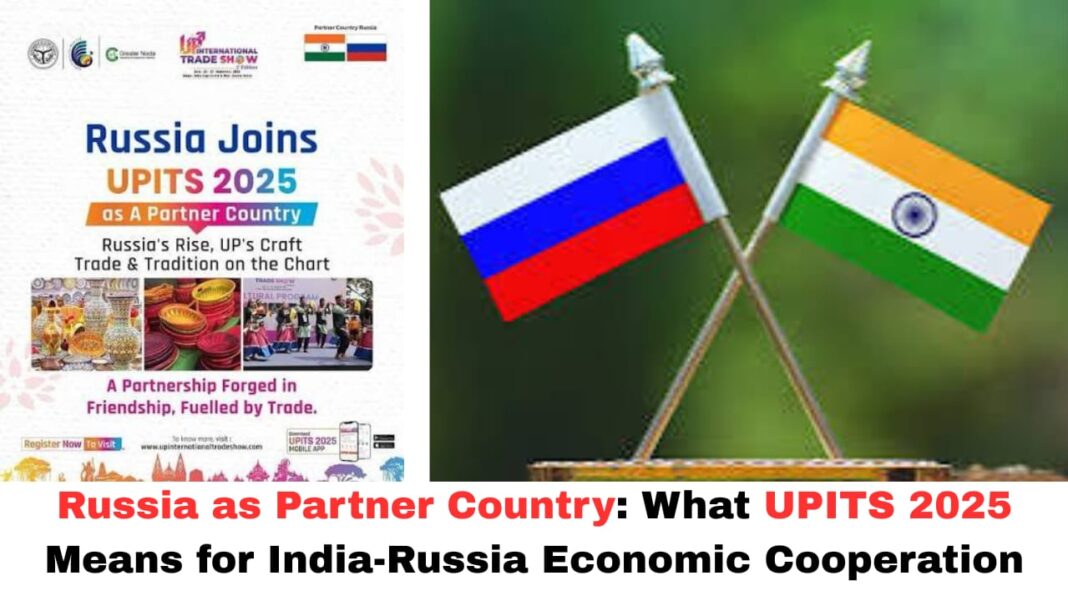Digital News Guru Uttar Pradesh Desk:
Russia-India Business Dialogue at UPITS 2025: A Turning Point in Bilateral Economic Cooperation
As the third edition of the Uttar Pradesh International Trade Show (UPITS) unfolds from September 25-29, 2025, one of its key highlights is the much-anticipated Russia-India Business Dialogue scheduled for September 26 at Greater Noida’s India Expo Mart. With Russia named as the Partner Country for UPITS 2025, this dialogue aims to deepen and broaden the economic, technological and educational cooperation between India—and in particular the northern state of Uttar Pradesh—and Russia.
Background & Strategic Setting
Uttar Pradesh, under the leadership of Chief Minister Yogi Adityanath, has been positioning itself as a hub for global investment, leveraging reforms in infrastructure, ease of doing business, and transparent policies to attract foreign partners.

This year, the State has succeeded in formally inviting Russia to play a major role in UPITS 2025. An official letter from the Russian government confirming participation has been received. The Russian delegation will include stakeholders across banking, education, energy, IT/ITES, skilling, and cultural sectors. A nine‐member cultural troupe will also perform at the show, underlining the cultural diplomacy component of this engagement.
The selection of Russia as the partner country and the structure of the business dialogue reflect rising interest in leveraging India-Russia relations not just at the level of diplomacy, but in concrete trade, investment, education, and technological cooperation. This is also consistent with recent bilateral developments—such as agreements after the India-Russia foreign ministers’ meeting in Moscow to boost trade ties and joint projects in energy and hydrocarbon sectors.
What the Dialogue Aims to Achieve
The Business Dialogue, from 11:00 AM to 2:00 PM on September 26, will bring together business leaders, policy makers, financial institutions, educationists, and representatives from insurance and technology sectors from both countries.
Its agenda includes:
- Trade promotion: Identifying new corridors of commerce between Russia and India, including untapped sectors.
- Technological cooperation & transfer: Understanding how Russian expertise—especially in education, energy, possibly defence, and technology—can integrate with Indian capacity, including joint R&D, skill development, and possibly co-manufacturing.
- Joint ventures & investment models: Exploring business models that allow Russian firms to invest in Uttar Pradesh’s existing and upcoming industrial and infrastructure projects. Likewise, Indian entrepreneurs may explore opportunities in Russia.
- Capacity building: This includes education partnerships (universities, skill training), insurance and finance, and ensuring that local industries and MSMEs (micro, small, medium enterprises) in Uttar Pradesh benefit through employment and technological upliftment.
Officials also expect that the participation of Russian companies in Uttar Pradesh’s “mega projects” and industrial policies will help generate employment, accelerate development, and integrate Uttar Pradesh’s economy more deeply into global value chains.

Uttar Pradesh’s Stakes and Strategic Advantages
For Uttar Pradesh, the potential gains from this Russia‐India Dialogue are multi-fold:
- Investment & Industrial Growth: UPITS 2025 offers a platform to showcase the State’s nascent and existing industries, especially in sectors like IT/ITES, skilling, education, energy, and manufacturing. The Russian partner role brings credibility and draw for foreign investors.
- Job Creation & Skill Upgradation: Joint projects, technology transfers, and capacity building will require skilled workers, thereby boosting skill development initiatives. UP’s large youth population can benefit from education and training tie-ups.
- Global Market Access for Local Businesses: MSMEs, local artisans (including under ODOP – One District One Product), and small‐scale producers can get exposure to Russian markets and possibly collaborations with Russian firms, giving them opportunities to scale and improve competitiveness.
- Strengthening of Policy Environment: The event underscores that Uttar Pradesh’s recent reforms—ease of doing business, infrastructure investment, openness to foreign investment—are being recognized and leveraged. That helps in building confidence among international partners.
Challenges & Considerations
While the prospects are significant, there are several challenges to be mindful of:
- Regulatory and logistical issues: Formal MOUs or agreements need to be followed up with implementation, which means dealing with cross‐border regulatory barriers, customs, trade policy, and possible geopolitical risks.
- Technology gaps & localization: Russian firms may have different standards, practices, or cost structures; integrating them with Indian/UP local ecosystems may require localization of technology, training, and adaptation.
- Sustainable and equitable growth: It will be important to ensure that benefits are not concentrated among large firms but also reach smaller businesses, districts with less development, and help in reducing regional disparities.
- Geopolitical dynamics: Given the global context (sanctions, trade wars, energy politics), India and Russia both need to balance their engagement with other global partners, which may affect investment flows or strategic cooperation.

Looking Forward: What Success Might Look Like
If the Dialogue delivers on its promises, we might see:
- A series of MOUs or joint venture announcements shortly after UPITS 2025, particularly in sectors like education, insurance, and technology.
- Entry of Russian firms or investment in UP’s industrial corridors, or collaboration in energy, IT/ITES, or skilling institutions.
- Enhancement of export orders or trade flows between Uttar Pradesh and Russia over the coming year.
- Stronger cultural and educational linkages—student exchanges, university partnerships—that can have long-term multiplier effects.
- Greater visibility for UP’s brands, MSMEs, and products in global fairs, possibly leveraging the state’s participation in other international forums.
Conclusion
The Russia-India Business Dialogue at UPITS 2025 is more than just another event—it is a strategic effort to convert diplomatic goodwill into measurable economic outcomes. For Uttar Pradesh, it represents a watershed moment: the state is no longer a peripheral participant in global trade but is actively shaping itself as a destination for international investment, innovation, and business collaboration. If implemented well, this initiative could mark the beginning of a deeper, more diversified, and sustainable India-Russia economic partnership—anchored not just in trade, but in technology, education, and equitable development.
You May Also Read: Air India Express Flight IX-2658 Makes Emergency Landing After Bird Strike








